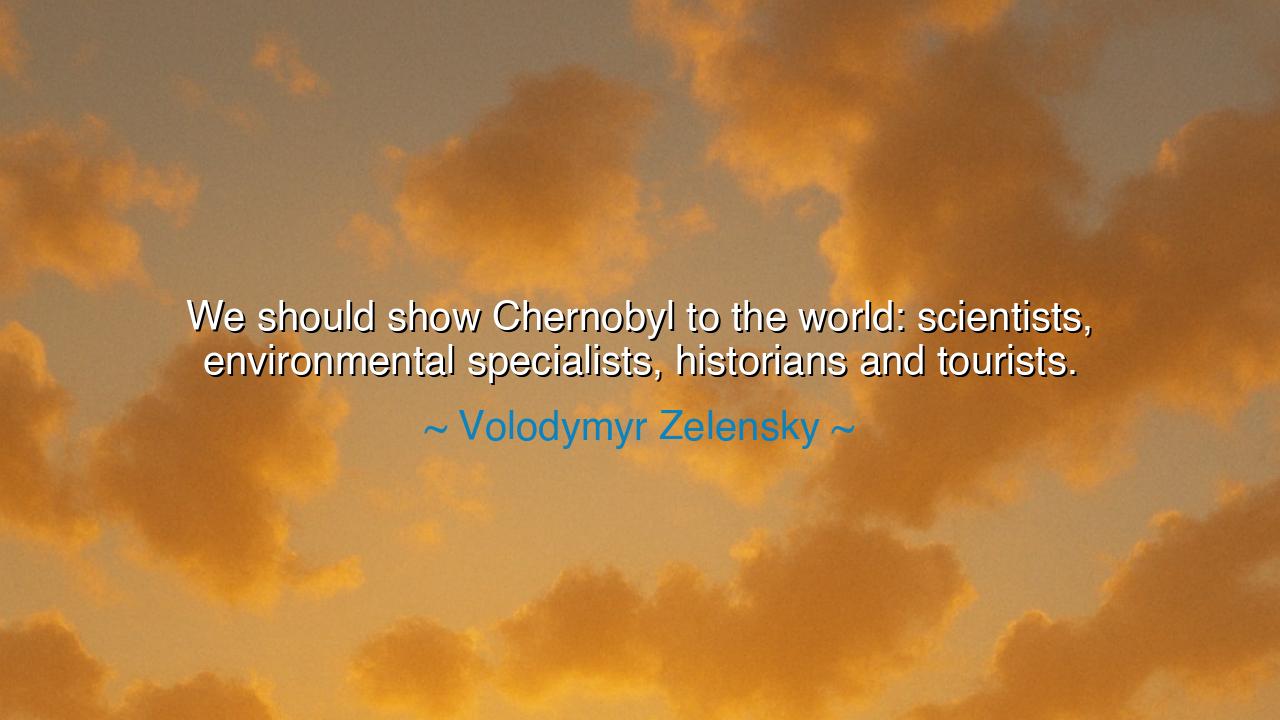
We should show Chernobyl to the world: scientists, environmental
We should show Chernobyl to the world: scientists, environmental specialists, historians and tourists.






When Volodymyr Zelensky declared, “We should show Chernobyl to the world: scientists, environmental specialists, historians and tourists,” he spoke not merely as a leader of Ukraine but as a guardian of memory. His words rise from the soil of tragedy and resilience — from a land that witnessed one of humanity’s darkest mistakes and yet dared to turn that scar into a lesson for the ages. The statement carries the tone of both a warning and an offering: that truth, no matter how painful, must never be buried, for only through remembrance can the world be redeemed.
The Chernobyl disaster of 1986 was more than a nuclear accident; it was a rupture between human ambition and natural law. In the quiet hours of April 26, an explosion tore through Reactor No. 4 of the Chernobyl Nuclear Power Plant, spreading invisible death across the skies of Europe. Whole towns vanished beneath radiation’s shadow; families fled and never returned. For decades, the site remained a forbidden zone — a symbol of fear and denial. But when Zelensky spoke of opening Chernobyl to the world, he was calling for something greater than tourism. He was calling for transformation through truth.
To “show Chernobyl to the world” is to confront humanity’s arrogance — our belief that we can command nature without consequence. Zelensky understood that by unveiling this wound, Ukraine could teach a vital lesson: that technology without morality, and progress without humility, are paths to ruin. In his vision, scientists come not to exploit, but to study and heal; environmental specialists to restore what was lost; historians to record what must never be forgotten; and tourists, not as idle spectators, but as witnesses — participants in the sacred act of remembrance.
History has shown that facing one’s past, however painful, is the only path toward wisdom. When the ruins of Pompeii were uncovered after centuries of silence, they revealed not only the violence of nature but the beauty and fragility of human life. When the Hiroshima Peace Memorial was erected, it stood not as a monument to destruction, but to peace and repentance. Likewise, Chernobyl, in Zelensky’s eyes, must stand as both tomb and teacher — a warning to the world of what happens when power outpaces prudence.
In this sense, Zelensky’s words are deeply moral. He rejects the impulse to hide shame beneath silence. Instead, he transforms catastrophe into wisdom, ruin into reverence. The act of showing Chernobyl is not exploitation, but purification — a declaration that truth, even when born of suffering, has the power to enlighten. The world must see what human hands have done, so that future generations may refuse to repeat it.
There is also something profoundly heroic in Zelensky’s vision. For too long, Chernobyl was treated as a symbol of despair; yet he invites the world to see it as a site of resilience. Life has returned to the Exclusion Zone — deer and wolves roam freely, the forests reclaim the streets, and nature, in its quiet mercy, forgives what humankind destroyed. By opening Chernobyl, Ukraine reclaims agency over its story. No longer a land of victims, it becomes a land of teachers — reminding the world that healing begins with honesty.
The lesson of this quote reaches beyond one nation. Every civilization has its own Chernobyl — a moment of folly or suffering it would rather forget. But wisdom demands remembrance. We must show our wounds, not to glorify them, but to learn. Let every disaster become a lesson, every tragedy a teacher, every silence a song of warning.
Thus, when Volodymyr Zelensky says, “We should show Chernobyl to the world,” he speaks as a prophet of remembrance. His words urge us to face our collective past with courage, to study the ashes until they yield understanding, and to carry those lessons into the dawn of renewal. For only a world that dares to look upon its own darkness can truly step into the light.






AAdministratorAdministrator
Welcome, honored guests. Please leave a comment, we will respond soon